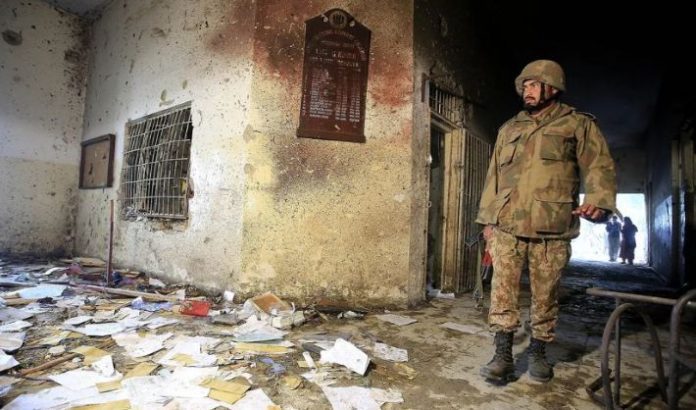ISLAMABAD, JAN 15 – In the ongoing hearing of intra-court appeals against civilian trials in military courts, the seven-member constitutional bench of the Supreme Court, led by Justice Aminuddin, questioned why the attack on the Army Public School (APS), despite involving the Army Act and a criminal conspiracy, did not lead to a military court trial.
Justice Aminuddin remarked, “We acknowledge the presence of military courts, but we need to assess the ‘patch’ that has been applied within the system.” The bench also included Justices Jamal Mandokhail, Mohammad Ali Mazhar, Hassan Azhar Rizvi, Musarat Hilali, Naeem Akhtar Afghan, and Shahid Bilal Hassan.
The hearing centered around arguments presented by the Ministry of Defence’s lawyer, Khawaja Haris, who emphasized that military courts are established under the Army Act for crimes linked to armed forces. He clarified that civilian trials are not under discussion; the matter at hand is the trial of crimes under the Army Act.
Justice Mandokhail raised concerns about the intent behind crimes, questioning whether the defendant’s motives would be considered in military trials. Khawaja Haris responded that in cases related to the Army Act, the trial would take place in a military court regardless of the intent of the individual.
The bench noted that the 21st Amendment, which legalized military court trials, was enacted under specific circumstances, such as the APS attack. Justice Mandokhail referred to the amendment, stating that even after the tragic attack on an Army school, military trials were not possible without a constitutional amendment.
During the session, Khawaja Haris referenced past judgments to support his arguments about the link between crime and the Army Act, stressing that trial locations are determined by the nature of the offense. However, the bench was keen to delve deeper into the constitutional implications of this process, questioning why certain attacks, like those on military installations, were not subjected to military trials under the existing framework.
As the hearing continued, Justice Mandokhail raised the issue of why constitutional amendments were required for the trials of terrorists in military courts despite the Army Act being in place during incidents like the APS attack. The case remains a critical examination of civilian justice versus military tribunals, with the court adjourned until tomorrow for further deliberations.
The intra-court appeal against military court trials for civilians remained inconclusive today as Defense Ministry lawyer Khawaja Haris will continue his arguments (Thursday).
During the hearing before a seven-member constitutional bench of the Supreme Court, the tragedy of the Army Public School attack, the 21st Constitutional Amendment, and former Senate Chairman Raza Rabbani’s remarks were mentioned.
Justice Jamal Mandokhel remarked that while the existence of military courts is acknowledged, there must also be a review of the “patch on velvet.”
Justice Hassan Azhar Rizvi noted that Raza Rabbani had cried after voting in favor of the 21st Constitutional Amendment, and those tears are now part of history.
The hearing on the intra-court appeal will continue tomorrow, with Khawaja Haris presenting further arguments.
The bench, led by Justice Ameenuddin, referred to the specific circumstances of the 21st Amendment, which was enacted following the APS attack to address terrorism.
Military trials for terrorists were made possible under this constitutional change. Haris argued that the criminals involved in incidents like the May 9 attacks fall under the jurisdiction of military courts.
The 21st Amendment was made for specific conditions, including the APS attack, where military trials became necessary. Haris emphasized that such trials, even without the amendment, could still take place under the military courts system.

















